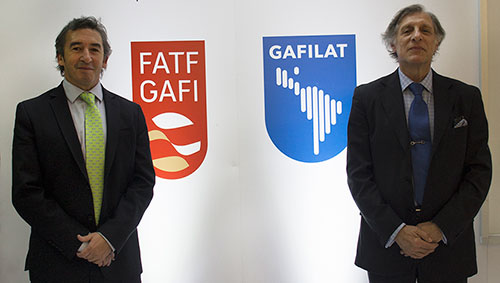President’s summary of outcomes from the FATF/GAFILAT workshop on anti-money laundering (AML)/ countering the financing of terrorism (CFT) for judges and prosecutors: experiences, challenges and best practices
Quito, Ecuador Republic
25-26 September 2017
The FATF and FATF-Style Regional Body (FSRB) GAFILAT held a workshop for judges and prosecutors that focused on their experiences, challenges and best practices in investigating and prosecuting money laundering and terrorist financing and confiscating criminal proceeds. The Ecuador Republic hosted the event in Quito from 25 to 26 September 2017 with the support of GAFILAT, the Ministry of Justice of Argentina and the German Development Cooperation.
Purpose
The workshop provided a venue for practitioners to share their experiences of the challenges they face during the investigation and prosecution of money laundering and terrorist financing offences and the confiscation of proceeds linked with crime or terror. Participants shared examples of how to overcome these challenges and discussed effective mechanisms and good practices.
Approximately 70 delegates representing 21 delegations, including AML/CFT expert prosecutors, investigative and trial judges participated in the FATF/GAFILAT workshop. FATF President Santiago Otamendi and GAFILAT President, Mr. Eugenio Curia chaired the event.
Future events
Outreach to the Prosecutorial Services and Criminal Justice System is an iniative by FATF President Santiago Otamendi of Argentina and one of the FATF Priorities for 2017-2015.
The workshop in Quito, Ecuador was the first in a series of workshops that the FATF and FSRBs will jointly organize this year. The next workshop will take place in January 2018 for judges and prosecutors of the Asia-Pacific region and will be organized jointly with FSRBs the Eurasian Group (EAG) and the Asia/Pacific Group on Money Laundering (APG).
The outcomes of the discussions at these workshops will contribute to a President’s paper that will identify the challenges that prosecutors and the judiciary face, and suggest good practices to deal with them. This should improve the effectiveness of prosecutorial services and criminal justice systems to prosecute terrorist and criminals who abuse the financial sytem and confiscate assets related to crime.
FATF will continue its focus on enhancing engagement with national Prosecutorial Services and other experts within Criminal Justice Systems to build synergies, and ultimately improve the effectiveness of AML/CFT efforts.

Left to right: FATF President Santiago Otamendi, GAFILAT President Eugenio Curia.


 Twitter
Twitter
 Facebook
Facebook
 Instagram
Instagram
 Linkedin
Linkedin
